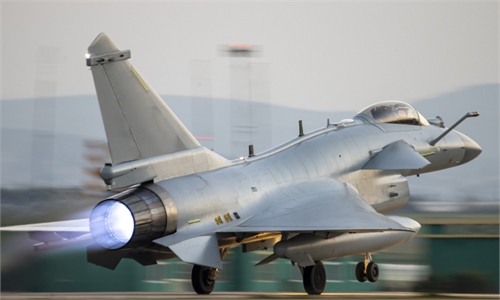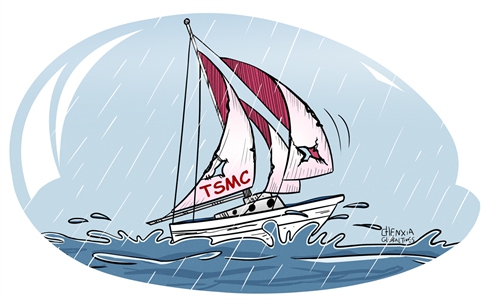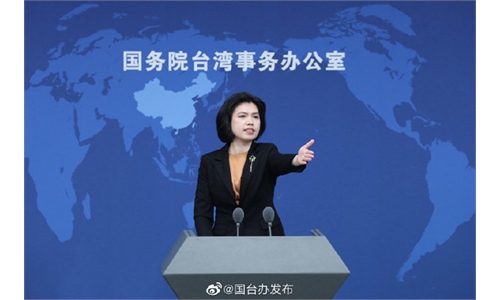Why the US will lose a war with China over the Taiwan question: Pentagon whistleblower
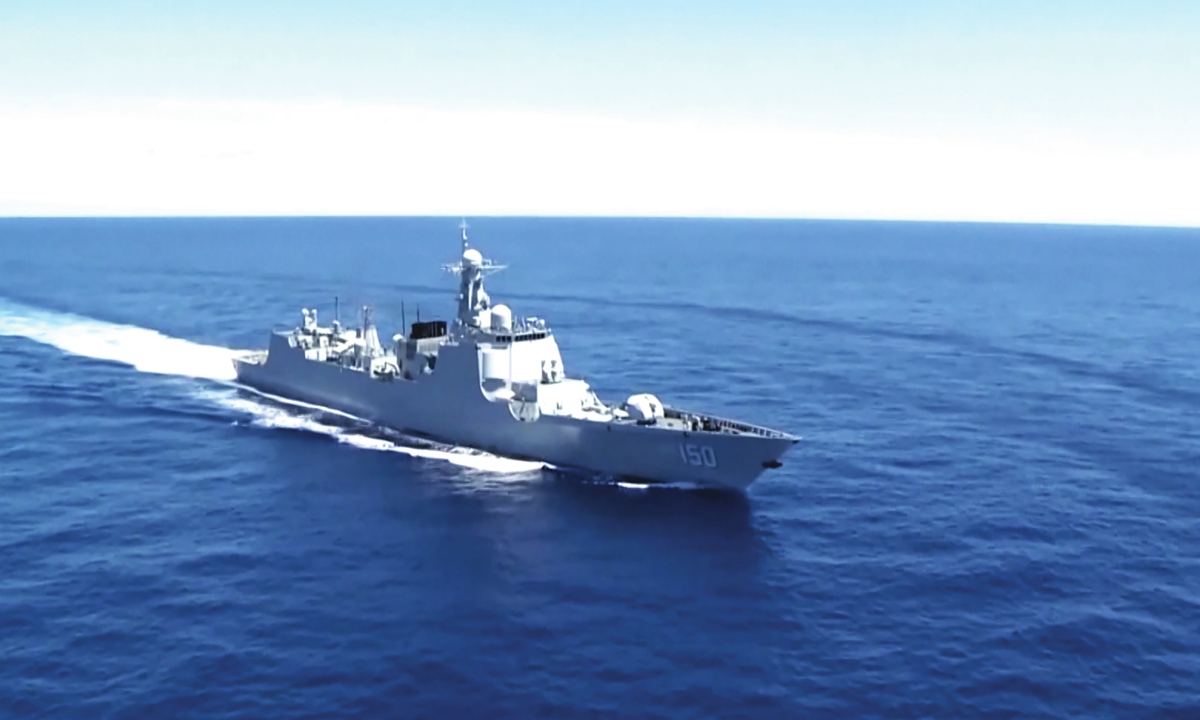
The Chinese People's Liberation Army Eastern Theater Command organizes combat-oriented joint exercises in the sea and airspace around Taiwan Island on August 3 2022. Photo: VCG
Editor's Note:A war with China over the Taiwan question is a conflict that the US cannot win and should never be fought, warned Franz Gayl (Gayl), a retired Marine Corps infantry officer and Pentagon whistleblower, in his recently published book The United States will lose the coming war with China. Since May 2021, Gayl has contributed articles to Global Times (GT) criticizing the US' dangerous Taiwan policy and calling for US' rationality to avoid a war in the Taiwan Straits with China, despite being put under a counterintelligence investigation and forced to retire from his Pentagon position for writing pieces in the Chinese media outlet. Why did he choose to collect all the articles he contributed to GT so far and publish them as a book? Why is he so concerned about the US' Taiwan policy and the Taiwan Straits situation? Here is an exclusive interview between Gayl and GT reporter Yu Jincui.
GT: What inspired you to conceive the idea of publishing a book comprising all the articles you had submitted to the Global Times?
Gayl: The articles in this book remain relevant, and I feel compelled to share my insights again as relations between our countries continue to deteriorate. I care deeply about my country, especially the young men and women in the military who will dutifully carry out the orders of their civilian and military leaders. Unfortunately, all indications point to the US sleepwalking into an imminent war with China over the Taiwan question, a conflict that should never be fought.
The US' foreign policy in the region is militarized with China pigeonholed as our enemy. The public is told that encouraging Taiwan's secession while containing China regionally are somehow existential causes for the US. However, the US public is not being told that militarily intervening in China's internal sovereign affairs will lead to an unjustified total war. The US government-puppeteered media is performing censorship by selective omission, and the articles in this book attempt to fill the public awareness gaps.
GT: What influence are you expecting from this book?
Gayl: I have no expectations beyond hope, as it appears that my warnings over the years have been of no consequence. However, if new readers consider the viewpoints and perhaps share my concerns, they can still express their opinions to elected officials.
I am optimistic because, through the kind assistance of my publisher, Triumph Press, the collection is now available on Amazon. It is also possible that a Chinese publisher may translate and make available in China the same book. This might prompt US officials, who are normally dismissive of any Chinese positions, to read the English version.
I do not want to see American soldiers, sailors, airmen, and marines maimed and killed in a war fighting for a cause that the US will ultimately abandon, as what happened in Vietnam and other conflicts.
Some may argue that my motivation for publishing this book is to make money from its sales. Others may claim the book is a vanity project aimed at gaining 15 minutes of fame. Still others may suggest that I am intentionally or unintentionally serving as a tool for Chinese propaganda.
However, I want to clarify that I have not received any payment from the Chinese for my views, and all profits from the book will be donated to charities supporting US veterans. As a retired Marine and a concerned citizen, my only motivation is to alert people to a threat to America's best interests that must be prevented.
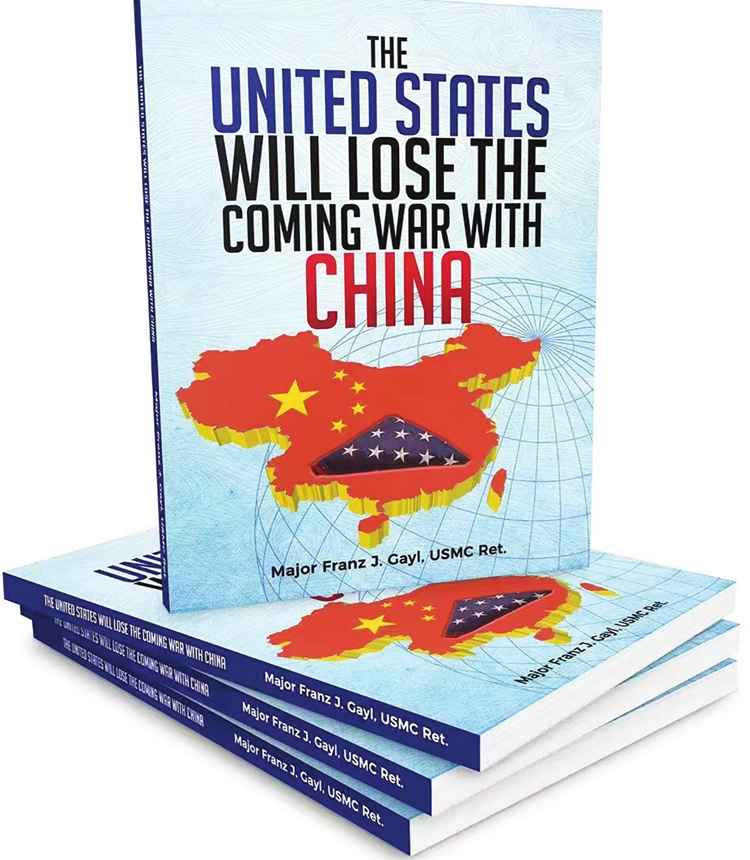
Cover of the book The United States will lose the coming war with China
GT: Why have you kept calling for preventing a war between China and the US over the Taiwan question? How do you see the possibility of a war between the two sides in the Taiwan Straits?Gayl: The possibility of war has grown. The number of military assets in the South China Sea, the Taiwan Straits, and the region have certainly increased in density. As a result, the possibility that war could be triggered by accident in congested seas and airspace has also increased. The situation has been further aggravated by the US providing more security assistance and advanced weapons sales to Taiwan, and more officials visiting the island. It appears that the US has adopted a "One China, One Taiwan" policy that could culminate in Taiwan's recognition by the US as an independent nation. A neutral observer would come to this conclusion.
US Secretary of State Antony Blinken recently visited China, during which he reiterated decades of US policy toward Taiwan when he said the US does not support a declaration of independence by the government on that island. The Secretary's statement was carefully expressed in a fashion some refer to as "smoke and mirrors." The statement "The US does not support a declaration of independence by the government on that island" is equivalent to "The US does not discourage a declaration of independence by the government on that island." The two are the same.

Franz Gayl Photo: Courtesy of Gayl
GT: You accuse US decision-makers of ignoring China's well-documented historical claims to Taiwan island. Considering that the US military and diplomatic experts pride themselves on being well-read, how can they persist in this lack of awareness when there is a possibility of war?Gayl: For the sake of peace in the Indo-Pacific it is critical that Americans read China's White Paper "The Taiwan Question and China's Reunification in the New Era." Our false history must be replaced by this authoritative history before it is too late.
Archeological and historical records show that Taiwan has belonged to China continuously since AD 230. In 1662 during the Ming Dynasty, General Zheng Chenggong led an expedition and expelled Dutch colonists from the island. Subsequently, the Qing court gradually set up more administrative bodies in Taiwan. In 1684, a Taiwan prefecture administration was set up under the jurisdiction of Fujian Province. In 1885, Taiwan's status was upgraded and it became the 20th province of China.
The centuries of continuous Chinese governance ended abruptly in 1895 when Imperial Japan defeated the Qing Dynasty in war. A militarily weak China was forced to cede governance of its island province to Japan. Taiwan's Han Chinese citizens - over 95 percent of Taiwan's population today - were then for 50 years relegated as subjects under ruthless Japanese occupation.
After the Japanese defeat in the WWII, China recovered Taiwan de jure and de facto through a host of documents with international legal effect. However, to accommodate their American protector's ambitions and protect their own interests in Asia, Japanese silence implies concurrence with a false US history of Taiwan. Fabrications include: Before Japanese occupation, Taiwan residents had never been considered Chinese. Japanese occupiers treated Taiwan residents well, and the sexual enslavement of Chinese women there is a myth. Taiwan, therefore, belonged solely to the Japanese when it was ceded to the Allies in 1945 and has been a democracy ever since.
Each lie is easily proven false. But each is repeated thereby misleading listeners to misinterpret the meaning of the comment that "Taiwan has never been a part of or governed by the PRC." The US shell game mixes truth and fiction and leads to the false public conclusion that the island has always existed as an ethnically distinct sovereign polity separate from China.
For the US and Japan, the arrangement has been useful. The US has solidified its hegemony across the vast Pacific and effectively colonized Taiwan as a military outpost. The technically capable Japanese have refrained from developing their own nuclear arsenal, instead enjoying wealth accumulation under the protection of the US nuclear umbrella.
But with WWIII on the horizon the historical record must be corrected to reflect the truth. Americans need to read China's white paper to mitigate war.
GT: You said in the book that US interest in the Taiwan island is its value as strategic terrain in a war with China, not its 24 million citizens. Why do you say that? Can you elaborate?
Gayl: We can't read the minds of US policymakers to determine intent. Still, patterns of statements and actions pertaining to Taiwan island are evidence of US disregard for the fate of Taiwanese citizens.
In 1949 General Douglas MacArthur stated that Taiwan's sole value to the US was its use as an "unsinkable aircraft carrier" in war. Nothing has changed in practice since then. Later, the US stationed nuclear-armed Matador missiles aboard the island even though Taiwan's society would be destroyed in a nuclear war.
Large amounts of US conventional arms are being provided to Taiwan through sales and security assistance. There is also evidence that the US is increasing its military presence in the region, which could potentially be used in conjunction with the weapons provided to Taiwan.
Unlike Ukraine, the island province has no land bridges over which its 24 million citizens can be evacuated. Apart from the US saving its 80,000 citizens on the island, there are no known plans to safely evacuate the majority of the population. In the event of a war, the island's terrain and environment will make it difficult for people to access farmland and cities due to obstacles such as mines, unexploded bombs, and nuclear fallout, which will also contaminate the cities.
Press outlets have reported that US forces plan to destroy Taiwan's chip manufacturing facilities to prevent them falling into the hands of Beijing. US sabotage of the island's electrical, water, sewage and transportation infrastructure is conceivable for the same reason. This technique is referred to as a "scorched earth." The Taiwan residents should not be surprised when their US protector turns to these tactics.
American officials will deny that Taiwan's citizens are expendable. But US statements of unwavering commitment to Taiwan today mirror past statements of US commitment to South Vietnam, before the US shamelessly abandoned its ally. The Taiwan residents need to wake up while there is still time.
GT: There is a view that China and the US should develop a "bottom-line" mindset to treat each other, especially regarding the Taiwan question. This means the US must respect China's bottom line. Do you think the two sides currently have a bottom line mindset?
Gayl: Both countries have a strong commitment to their respective positions, which they view as a "bottom line" or a red line that cannot be crossed. However, the Chinese and American bottom lines on Taiwan are fundamentally in conflict, and the US has shown disrespect to the Chinese position.
When it comes to Taiwan, the island will always mean more to the Chinese than to the Americans. Long-term endurance as a measure of casualties and societal hardships will favor the contestant who has more at stake. China is willing to endure much more pain to reunify One China than the US is willing to do to prevent it.
The confrontation is particularly dangerous today because China and the US are peer nuclear powers. The inevitable end when the US abandons the cause can be predicted. The violence that both sides will inflict on each other before the US reaches that conclusion and respects the Chinese position will be a regional and global tragedy.
